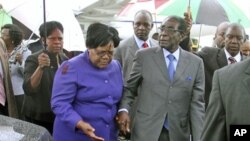With Zimbabwean President Robert Mugabe back in government action this week following media reports he was severely ill, analysts and opposition activists now worry for Zimbabwe, which they say is further unraveling under his rule.
Mugabe - in power since the 1980s - is now in a rush to have a promised constitutional reform finished and new elections held as soon as possible.
Steve McDonald, the Africa director at the Woodrow Wilson International Center for Scholars in Washington, said he believes poor health is guiding the president's survival strategies.
"His health is flagging. He may be concerned about his longevity, his mortality and wants to unfold this very quickly," he said.
The chairman of the U.S. chapter of Zimbabwe's Movement for Democratic Change [MDC], Den Moyo, agreed.
"It clearly has got to do with his health as he knows that he still wants to run for the presidency, and that with his deteriorating health that might not be possible if the elections are not held this year," said Moyo.
Moyo fears the upcoming elections will be even worse than the last cycle in 2008, when they were marred by violence and rigging, even as the MDC ended up winning more lower-house parliamentary seats than Mugabe’s ZANU-PF party.
"ZANU-PF now knows the power that MDC is commanding among the Zimbabwean voters and therefore they will go all out to ensure that they are not only going to do whatever it takes to rig the elections, but they are going to do whatever it takes to intimidate the voters through violence," said Moyo.
Todd Moss, a senior fellow at the Center for Global Development in Washington, said Mugabe is relying on a small group of military officials who, in his words, "squelch out" any challenge to their hold on political and economic power.
Moss worries about Zimbabwe's black empowerment ministry's recent announcement to give the government majority ownership of all foreign-owned mining companies.
"The opportunities for stealing from the country and handing out to cronies as part of ZANU-PF's patronage network, they have mostly been depleted now so they are going after the few remaining businesses that are out there, and really the mining companies are the last big prizes out there," said Moss.
The Wilson Center expert, McDonald, who said he was a big Mugabe admirer when he emerged as Zimbabwe’s leader, said what he views as a tragic turn of events continues.
"I never saw this coming. What began to happen toward the end of the 1980s, but particularly when the mid-90s rolled along and this last decade has just been horrific," said McDonald.
Many analysts blame Zimbabwe's economic decline on Mugabe's land reform policy, which confiscated and redistributed white-owned commercial farmland.
The 88-year-old president has defended his policies, as well as his ongoing rule, saying he refuses to bow to outside interference and agendas.
This week, Zimbabwe's information ministry blamed Western media for spreading "false rumors" about his health.
Under a regionally-brokered power-sharing deal between the ZANU-PF and the MDC, Zimbabwe needs to have a new constitution approved before new elections can be held.
News
Mugabe's Return Raises Concerns for Zimbabwe




